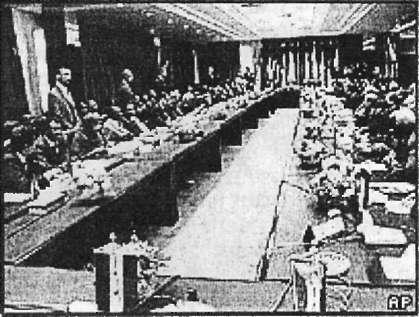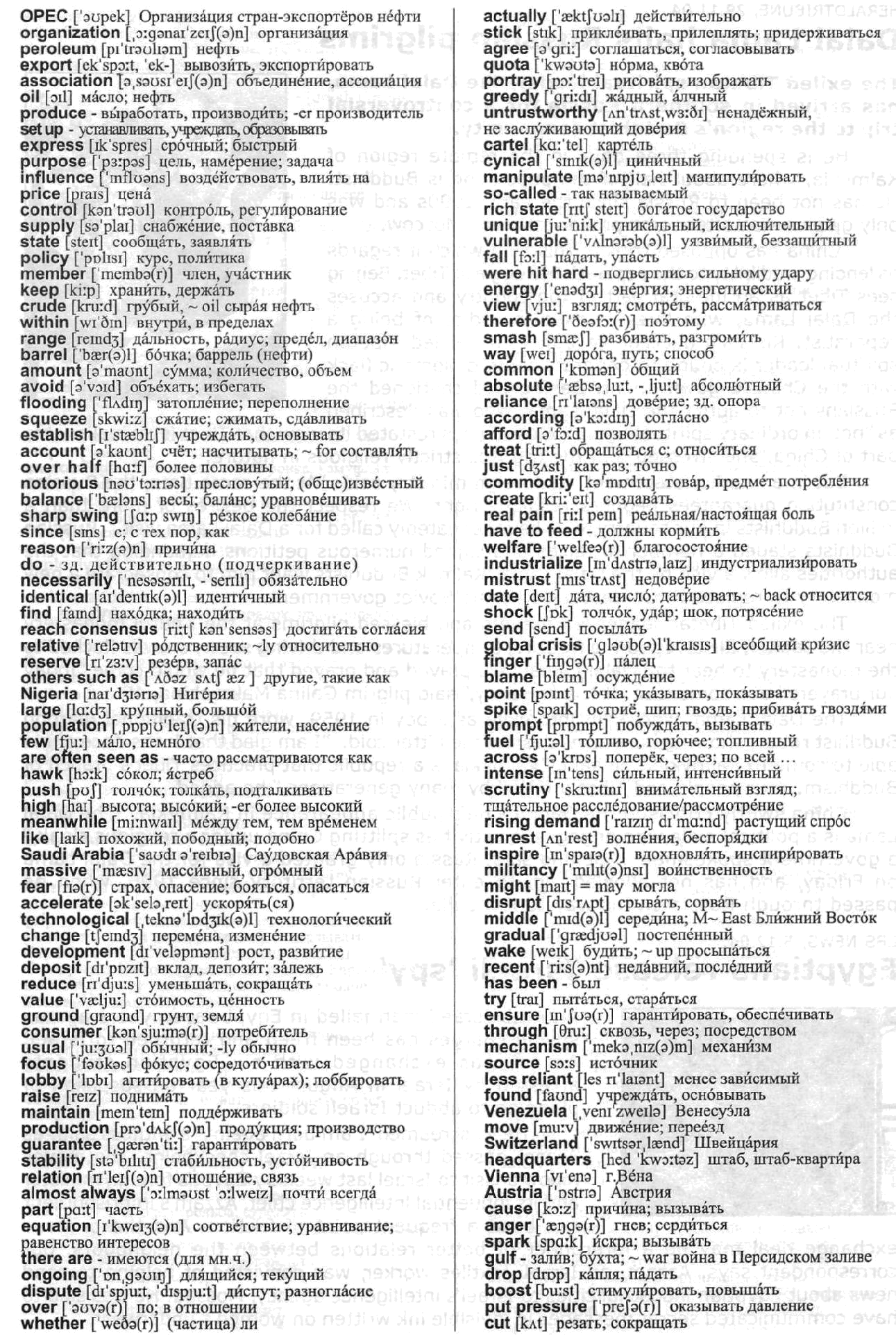
- •Наши рекомендации
- •Thatcher attends "coup plot' case
- •Putin's Atomic Boast
- •Plea not to judge Muslims by acts of extremism
- •Kodak to shed 600 uk jobs
- •World Trade Organization
- •Record fine for worker's death
- •China files lawsuit against Yukos
- •Scientist kept plutonium in garage
- •A foreign corner of an English field
- •Uk repatriates bodies of Chinese
- •Opec: The oil cartel in profile
- •Egyptians release Israeli 'spy'
- •Independent, 10 . 11 . 04 .
- •'Come bite me!' right...
- •'Treasure hunt' for bandit's loot
- •Thai protesters die in custody
- •Funny old world
- •Pupils suspended over airgun attack
- •Singapore to protect schools with guards
- •Naked man climbs into la jet
- •Hunt for missing golfing tourist
- •Military to help young offenders
- •'We're not all hooligans'
- •Shipwreck 'could yield billions'
- •Paddling policeman grabs record
- •Fact file: Nimrod Rl
- •Submarine issues call for help
- •Bird flu claims 147 tigers in Thailand
- •100 Million paper birds
- •Anglo-Saxon coin fetches 3230 000
- •Deadly typhoon tears across Japan
- •From Russia With Love
Opec: The oil cartel in profile
The Organisation of Petroleum Exporting Countries (Opec) is an association of oil producing countries set up with the express purpose of influencing oil prices by controlling supplies. The stated policy of the 11 member countries is to keep crude oil prices within a range of $22-28 a barrel.

To do that, the countries control the amount of crude oil they export and avoid flooding or squeezing the international marketplace. Established in 1960, its members account for over half of the world's crude exports. But the oil market is notoriously difficult to
balance, as demonstrated by sharp price swings in the years since Opec was set up. One reason for this is that Opec members do not necessarily have identical interests, and often find it difficult to reach consensus on strategy.
Countries with relatively small oil reserves, or others such as Iran and Nigeria with large populations and few other resources, are often seen as "hawks" pushing for higher prices. Meanwhile, producers like Saudi Arabia and Kuwait, with massive reserves and small populations fear that high prices will accelerate technological change and the development of new deposits, reducing the value of their oil in the ground. The US, the world's biggest oil consumer, usually focuses on Saudi Arabia and Kuwait when lobbying Opec to raise or maintain production so as to guarantee price stability.
And the need to maintain good relations with other member countries, and with the US and other consumers, is almost always part of the equation. There are also ongoing disputes over whether member countries are actually sticking to the agreed quotas. Opec is often portrayed in the West as a greedy and untrustworthy cartel, cynically manipulating the price of oil. But many of the so-called 'oil-rich states' are rich in very little else. Crude oil is their only export, making them uniquely vulnerable to world oil prices. When prices fell to $10 a barrel in 1998, many of their economies were hit hard.
Tony Scanlan, of the British Institute of Energy Economics, says: "In the US, Opec is viewed as a cartel and therefore something to be smashed - which is not a helpful way of thinking about it. "The one thing the Opec countries all have in common is their absolute reliance on one product - oil." According to Mr Scanlan, the Opec countries cannot afford to treat oil "as just another commodity". "When the price falls it creates real pain. They have to feed and give welfare to their people, the same as Western countries," he says.
Part of the industrialised world's mistrust of Opec dates back to the oil shock of 1973 that sent the global economy into crisis. The finger of blame was also pointed at Opec when prices spiked in the second half of 2000, prompting fuel protests across much of Europe. Opec is once again under intense scrutiny in 2004 as rising demand and fears that Iraqi unrest and al-Qaeda-inspired militancy might disrupt supplies from the Middle East are pushing US oil prices to record highs.
But the west is gradually waking up to the fact that in recent years Opec has been trying to ensure market stability through its price range mechanism. And, as more sources of oil come to market - especially from Russia - consumer countries have also become less reliant on oil from Opec countries.
1960 - founded by Iran, Iraq, Kuwait, Saudi Arabia and Venezuela

1965 - Moves from Switzerland to new headquarters in Vienna, Austria
1973 - High oil prices cause world economic crisis
1990 - Iraq anger at Kuwait over-production sparks Gulf War
1998 - World oil price drops to $10 a barrel 2000 - Opec puts squeeze on production to boost prices
2001- Opec puts pressure on non member countries to cut production
22

23
H E R A L D T R I B U N E , 29 . 11 . 04 .
Dalai Lama hails Russian pilgrims
The exiled Tibetan spiritual leader, the Dalai Lama, has arrived in southern Russia for a controversial trip to the region's Buddhist community.

He is spending three days in the remote region of Kalmykia, where about half of the population is Buddhist. He has not been to Russia since the early 1990s and was only given a visa after some prevarication by Moscow.
China has opposed trips of this kind which it regards as lending credibility to the separatist struggle in Tibet. Beijing sees Tibet as an integral part of the country and accuses the Dalai Lama, who lives in exile in India, of being a separatist. Russia's decision to admit the exiled Tibetan spiritual leader is bound to generate some diplomatic flack with the Chinese government. Beijing had cautioned the Russians not to admit the Dalai Lama, who was described
as "not an ordinary spiritual figure". Moscow has restated its view that Tibet is an inalienable part of China, and stressed that the trip was strictly religious in nature.
But in an earlier statement, its foreign ministry said: "At the same time, the Russian constitution guarantees people's religious right. We respect the desires of more than a million Buddhists in our country, who have repeatedly called for a Dalai Lama visit." Russian Buddhists staged a number of rallies and signed numerous petitions demanding that the authorities allow a visit by the Dalai Lama. Kalmyk Buddhists want him to consecrate a new monastery to replace those destroyed by the Soviet government.
The exiled Tibetan leader led prayers and blessed pilgrims at the Khurul monastery near the capital, Elista. Ignoring freezing temperatures and driving snow, crowds flocked to the monastery to hear the Dalai Lama. "We prayed and prayed that he would come. Today our prayers have come true. It is a huge joy," said pilgrim Galina Makrushina, 48.
The Dalai Lama, who went into exile as a boy in 1959, wore his traditional maroon Buddhist robes, showing bare arms despite the bitter cold. "I am glad that I was once again able to come to Kalmykia," he said. "Kalmykia is a republic that practices Tibet's branch of Buddhism. Your people and Tibet are tied by many generations," he added.
China swiftly criticised the Dalai Lama's public appearance in Kalmykia. "The Dalai Lama is a political exile who engages in activities splitting China under a religious cloak," a government spokesman in Beijing said. Russia only granted a visa for the Dalai Lama on Friday, and has not allowed him to enter Russian territory since 1996, when he passed through Russia on his way to Mongolia.
C B S N E W S , 5.12.04.
